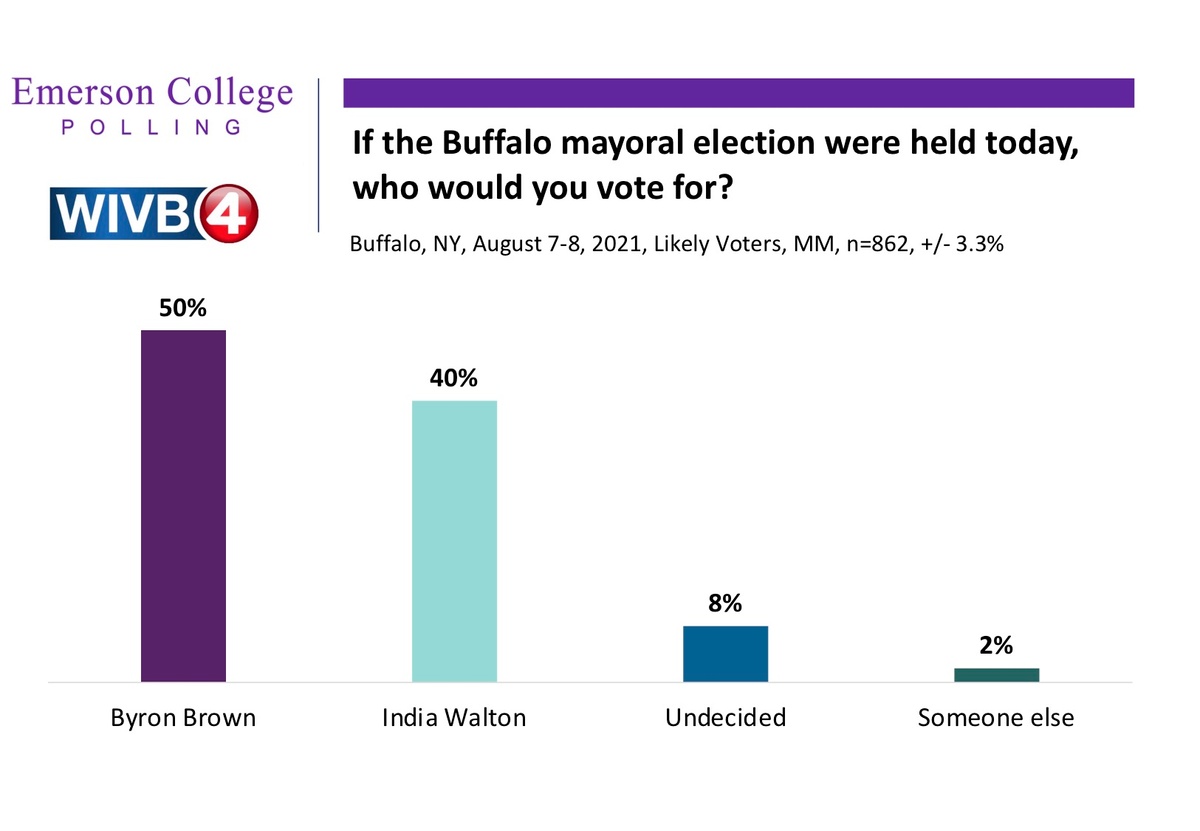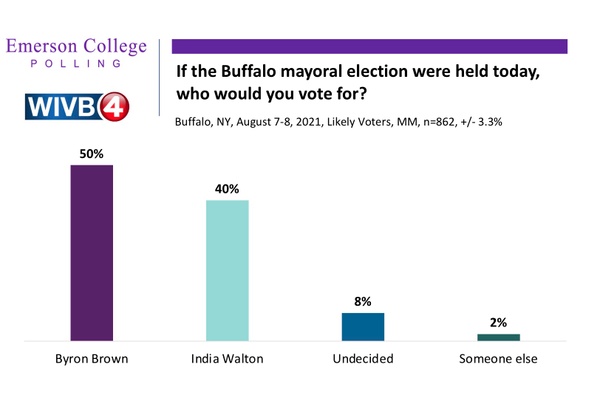The latest Emerson College/WIVB poll finds incumbent Mayor Byron Brown at 50%, ten points ahead of India Walton, the Democratic nominee, who is at 40%. Eight percent (8%) of voters are undecided, and 2% plan to vote for someone else.

Brown is leading among Hispanics (75% to 22%), men (54% to 40%), and all age groups over 35 years. Walton is leading among the 18-34 age group (56% to 38%), Black voters (45% to 43%), and those with a college degree (46% to 42%)
Mayor Brown is running a write-in campaign after losing the Democratic nomination to Walton in June. Democratic voters are split between planning to vote for Brown (47%) or Walton (46%), despite Walton winning the primary by 7 percentage points. This suggests that Brown may have a base that did not come out to vote in the primary, but is now tuning in for the general election.
A majority (58%) of voters are at least somewhat likely to consider writing in Mayor Brown, while 39% are unlikely, and 3% are unsure. A significant majority (80%) of voters have never written in a candidate in any election before, while 20% have written in a candidate.
When asked if Mayor Brown should have continued his campaign after losing the Democratic primary, a majority (53%) support his decision to run a write-in campaign, while 33% think he should have discontinued his campaign, and 14% are unsure.
A majority of voters (54%) view Brown favorably, with 34% unfavorable and 12% neutral. Walton’s favorability is more split, with 42% being favorable, 43% being unfavorable, 13% unsure, and 2% unfamiliar with Walton.
Voters were asked which candidate they trust most on two issues: handling crime and furthering development in Buffalo. On development, Brown is trusted by 54% of voters, while 39% trust Walton, 6% are unsure, and 1% said they trust someone else. The issue of crime was slightly more split, but Brown was still trusted more by a majority (50%) of voters, while 43% said Walton and 7% were unsure.
Issues
Voters were asked about what issue facing Buffalo should be the first priority of the next mayor, and crime led the list with 26%. Other listed issues were housing (15%), police reform (12%), education (10%), development (10%), jobs (10%), Covid-19 (6%), healthcare (3%) and homelessness (2%). Six percent (6%) of voters said something else.
A majority (52%) of voters reported a favorable view of the Buffalo Police Department, while 31% were unfavorable and 17% had no opinion. When asked further if the funding for the Buffalo PD should be increased or decreased, a plurality (42%) of voters said funding should increase. Twenty-six percent (26%) said funding should stay the same, while 22% said it needs to be decreased. Ten percent (10%) were unsure on the issue.
Voters were also asked their opinion of socialism, where a plurality (40%) reported an unfavorable opinion, 31% were favorable, and 30% had no opinion.
Voters are in support of a new Bills Stadium, with 58% saying it should be built in the city of Buffalo. Twenty-six percent (26%) are opposed to building the stadium in the city, and 16% are unsure. A majority (56%) think that taxpayers should fund some, but not all, of the new stadium, while 34% say none of it should be taxpayer-funded. Eight percent (8%) are unsure about the funding of a potential stadium, and 2% say it should be entirely taxpayer-funded.
Caller ID
The Buffalo Emerson College/WIVB-4 poll was conducted August 7-8, 2021. The sample consisted of Buffalo likely voters, n=862, with a margin of error (MOE) of +/- 3.3 percentage points. The data sets were weighted by gender, age, education, race, and party affiliation. It is important to remember that subsets based on gender, age, party breakdown, ethnicity, and region carry with them higher margins of error, as the sample size is reduced. Data was collected via a cellphone sample using SMS-to-web, and a landline sample using IVR.


